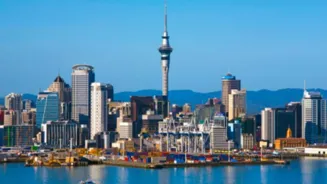For wealthy Indians seeking a second home, better education, or a stable base in an uncertain world, golden visa programmes—offering residency or citizenship for hefty investments—are a hot ticket.
New
Zealand Prime Minister Christopher Luxon said on Monday that investors on the foreign investor migrant visa reintroduced in April, could buy or build one home if it costs at least NZ$5 million ($2.94 million).
New Zealand’s Active Investor Plus Visa, relaunched in 2022, is among the priciest, designed to funnel serious money into its economy. But what does it offer, can holders snap up luxury properties, and how does it compare to other golden visas popular with Indians, like those in Portugal, Spain, Greece, and the UAE? Here’s a breakdown.
What’s The Deal With New Zealand’s Golden Visa?
Introduced in September 2022, the Active Investor Plus Visa replaced earlier investor programmes, shifting focus from passive real estate to active economic contributions. It requires a minimum investment of NZ$5 million (roughly Rs 25 crore) over three years, with options up to NZ$15 million. You can choose Growth (high-risk, direct business investments like start-ups or tech) or Balanced (a mix including managed funds). Direct investments count triple towards the minimum, nudging applicants towards bolder bets that fuel New Zealand’s growth.
The bar is high. You need to be over 18 years old, with clean health and character, and show basic English skills (think IELTS 5.0). Spouses and children under 25 can tag along, but you must spend time at least 21 days in New Zealand for Growth or 105 days for Balanced. In return, you get indefinite residency to live, work, and study, with a shot at permanent residency after three years and citizenship after five years of living there.
What is on offer for Indians? World-class healthcare, no inheritance or wealth taxes, and a serene lifestyle far from urban India’s hustle.
Applications take 3-6 months, with no cap on approvals, but you will need to prove your funds are legit and invest in approved areas, like NZTE-managed funds. For Indian tycoons, applications have spiked since Covid-19, drawn by family-friendly relocation and Asia-Pacific business opportunities.
Can You Buy A Luxury House?
New Zealand slammed the door on foreign homebuyers in 2018 to tame its red-hot housing market, but a new policy tweak, announced September 1, opens a window for Active Investor Plus holders. From late 2025 or April 2026, visa recipients can buy or build one luxury home worth at least NZ$5 million (Rs 25 crore). The catch? It should be for personal use—no short-term rentals—and you must commit to residency. This aims to attract ultra-wealthy investors while avoiding market speculation.
For Indians dreaming of Auckland penthouses or Queenstown villas, this is a golden ticket, provided you clear the visa hurdles. Critics, including opposition voices, argue it favours the elite during a housing crunch, but supporters say it will spark construction and economic growth. The deal is one high-end property per investor.
How Does It Compare To Other Golden Visas For Indians?
Golden visa programmes differ sharply, with Europe leaning on real estate and Schengen travel perks, while Asian options prioritise affordability. Here’s how New Zealand stacks up against top picks for Indians.
Portugal’s Golden Visa: A go-to for Indians, it starts at €250,000-€500,000 (Rs 2-4 crore) in funds, property, or job-creating ventures. Processing takes 6-12 months, offering Schengen visa-free travel to 26 countries, a low 7-day annual stay, and citizenship after five years with basic Portuguese. It is more affordable than New Zealand, but recent curbs have scrapped Lisbon and Porto real estate options to ease housing pressures. Tax breaks on foreign income sweeten the deal, though work rights come only with residency.
Spain’s Golden Visa: Requires €500,000 (Rs 4 crore) in property or funds, processed in 3-6 months. Like Portugal, it grants Schengen access and family inclusion, with citizenship possible after 10 years (sooner for Indians via bilateral agreements). No minimum stay is needed initially, making it flexible for Mumbai or Delhi elites eyeing Madrid villas. It is cheaper than New Zealand and property-focused, but lacks NZ’s tax-free inheritance.
Greece’s Golden Visa: The budget-friendly European option, starting at €250,000-€800,000 (Rs 2-6.5 crore) in real estate, depending on the area. It is fast (2-6 months), offers Schengen mobility, and allows rental income. Citizenship takes seven years, with no work rights. For Indians, it is an affordable entry to Europe, unlike NZ’s steep price, but does not demand language skills.
UAE’s Golden Visa: Flexible at AED 2 million (Rs 4.5 crore) in property or business, renewable for 5-10 years with no minimum stay. It is a tax haven (no personal income tax), ideal for Dubai-based Indian entrepreneurs, with easy business set-up. Unlike New Zealand, there is no citizenship path, but proximity and frequent flights make it a practical choice. It is less rigid on health or language requirements.
Asian Alternatives: Malaysia’s MM2H asks for MYR 500,000-1 million (Rs 1-2 crore) in deposits or property, with a 90-day annual stay. Thailand’s Elite Visa (THB 900,000-2 million, Rs 2-4.5 crore) is a membership offering 5-20 years without investment ties, but no work rights. Both are cheaper than New Zealand but lack citizenship paths or Schengen-like travel.
What To Conclude
New Zealand’s Active Investor Plus Visa comes with a high cost, high commitment, but with unmatched lifestyle perks and the chance to own a luxury home. It suits Indians seeking long-term settlement in a stable, scenic haven. European programmes like Portugal, Spain, and Greece, however, offer lower entry points and Schengen mobility, ideal for travel or investment diversification.
The UAE shines for tax savings and proximity, while Malaysia and Thailand are budget-friendly but limited in scope. Your choice hinges on priorities: New Zealand for a new life, Europe for flexibility, or Asia for ease. With programs shifting—Portugal nixed key real estate options—consult experts to navigate this high-stakes game.














